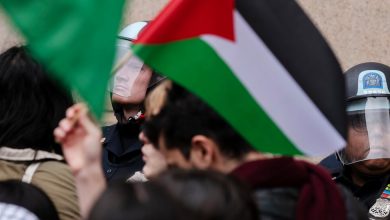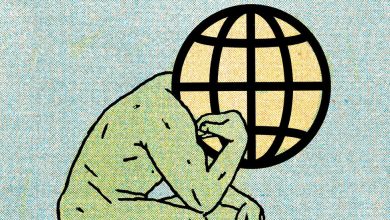Ukraine’s Eurovision winners don’t regret flouting the rules with a plea for Mariupol.

The Kalush Orchestra, Ukraine’s Eurovision Song Contest winners, had no regrets over pushing the boundaries of the competition’s ban on political content. In fact, the lead singer argued on Tuesday, there was no choice.
The singer, Oleh Psiuk, ended his performance in the internationally televised contest’s grand final on Saturday with an appeal on behalf of the devastated city of Mariupol, and the people trapped beneath its Azovstal steel plant, the last bastion of resistance against a monthslong siege by Russian forces.
“Help Ukraine, Mariupol!” Mr. Psiuk shouted. “Help Azovstal! Right now!”
Mr. Psiuk, 28, said he felt he had to use the platform the band has gained as one of the most effective international voices for a country at war, channeling public sympathy into an overwhelming victory in the contest’s 39-country phone-in vote.
“There were 200 million people watching us. No rule could have stopped us from delivering a message we feel in our souls,” he said. “And our Ukrainian souls tell us: If we can rescue a thousand people, in a way, while breaking the rules of a competition, then let’s do it.”
Since Monday night, when Ukraine ordered an end to armed resistance at Azovstal, dozens of fighters have been transported out, and a tense operation to surrender the plant and evacuate it has been underway.
Hundreds of Ukrainian soldiers are believed to be in the plant. It is still unclear what will happen to them, and whether they will be forced to surrender to Russia or become part of a prisoner swap.
The besieged fighters have become a potent symbol of courage and resistance for Ukrainians, with the whole country watching to see what becomes of them.
Mr. Psiuk said he feared for the soldiers’ fate.
“We need the help of the whole world,” he said in an interview, while visiting cheering fans in the western city of Lviv. “It’s really important to be heard.”
Support for the band’s winning song, “Stefania,” an anthemic blend of rap and folk music, has been seen as a form of European solidarity with Ukraine through pop culture.
Written to honor Mr. Psiuk’s mother, it has been reinterpreted during the war as a tribute to Ukraine as a motherland.
In Lviv on Tuesday, children sang the band’s song back to them, as Mr. Psiuk smiled at cheering crowds from beneath the floppy pink hat that has become his signature. The singer and break dancer known as “Carpetman” wore his quirky body suit, patterned like a Ukrainian folk rug, and posed for selfies.
Blending Ukrainian folk motifs into contemporary culture has become increasingly popular in the country ever since war with Russia erupted in 2014, which led to the illegal annexation of Crimea, Mr. Psiuk said.
“People are often a bit ashamed of their old folk or traditional music,” he said. “But if you present it properly, and do it in a modern way, instead you’ll get something really cool.”
Asked what they planned to do next, the band members said they would be touring Europe and promoting donations to Ukrainian forces.
But Mr. Psiuk said money and arms were not the only way to support his country.
“Everyone who speaks about the war in Ukraine is already helping us,” he said. “Help Ukrainian culture, listen to Ukrainian songs. Listen to us, listen to other performers. That also helps us, on every front line.”



